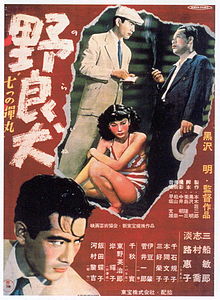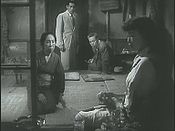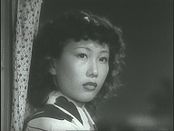- Stray Dog (film)
-
For the 1991 film by Mamoru Oshii, see Stray Dog: Kerberos Panzer Cops.
Stray Dog 
Directed by Akira Kurosawa Produced by Sojiro Motoki Written by Akira Kurosawa
Ryuzo KikushimaStarring Toshirō Mifune
Takashi ShimuraMusic by Fumio Hayasaka Cinematography Asakazu Nakai Editing by Toshio Gotō
Yoshi SugiharaDistributed by Toho Release date(s) October 17, 1949 Running time 122 minutes Country Japan Language Japanese Stray Dog (野良犬 Nora inu) is a 1949 film noir police procedural directed by Akira Kurosawa and starring frequent collaborators Toshirō Mifune and Takashi Shimura.
Contents
Plot
Action takes place during a heatwave in a bombed-out, post-war Tokyo. Rookie homicide detective Murakami (Toshirō Mifune) has his Colt pistol stolen during a trolley ride and gives chase to the pickpocket, but when he fails to capture him he reports back to headquarters filled with guilt and shame. He goes on to prowl the city backstreets undercover, looking for suspects and picking up leads. He eventually picks up the trail of a gun racket. When the stolen gun is used in a crime, Murakami partners up with the veteran detective Sato (Takashi Shimura).
After questioning a suspect, Sato and Murakami end up at a baseball game looking for a gun dealer named Honda. They locate him and he points to Yusa, a disenchanted war veteran who's fallen to crime after the war. They investigate Yusa's sister's house and his sweetheart, showgirl Harumi Namiki, but to no avail.
Murakami's gun is used in another crime, this time as the murder weapon. They question Namiki at her mother's house. The girl is still reticent to talk, so Sato leaves off to investigate Yusa's trail while Murakami remains behind. Sato comes across Yusa's last hideout. He places a call for Murakami, but just as he is about to reveal Yusa's location, the criminal makes a run for it. Sato attempts to give chase, but is shot in the rain and left for dead. A desperate Murakami arrives soon enough to donate blood to his friend at the hospital.
The following morning, Namiki has a change of heart and informs Murakami at the hospital that she had an appointment with Yusa at a train station nearby. Murakami races to the meeting and deduces who Yusa from his mud spattered clothing. He gives chase into a forest and is wounded in the arm. After a chase, Murakami manages to cuff Yusa, taking him into custody. Back at the hospital, Sato has recovered and congratulates Murakami on his first citation. Murakami reflects on Yusa's plight, reflecting on the parallels between him and the criminal. Sato tells him to forget about Yusa, and get ready for the cases he will have to solve in the future.
Production Notes
Kurosawa mentioned in several interviews that his script was inspired by Jules Dassin’s The Naked City and the works of Georges Simenon. [1] Kurosawa wrote the script with Ryuzo Kikushima, a writer who had never written a script before.
During the opening credits, there is footage of a panting dog. However, when American censors saw the footage, they assumed that the dog had been harmed. This run-in with American censors caused Kurosawa to remark that this was the only time he wished Japan had not lost WWII.[2]. The film released in the U.S in 1963.
Despite being noted as one of Akira Kurosawa's most critically renowned post-war films, Nora inu is not held in such high regard by he director himself. Kurosawa has been quoted as saying that he thinks little of the film, calling it "too technical" while also remarking that it contains "all that technique and not one real thought in it." His attitude had change by 1982 when Kurosawa's wrote in his autobiography that “no shooting ever went as smoothly,” and that “the excellent pace of the shooting and the good feeling of the crew can be sensed in the finished film.” [3]
Remake
The film was remade in 1973 as Nora Inu, starring Tetsuya Watari as Murakami and Shinsuke Ashida as Sato. The location was changed from Tokyo to Okinawa[4].
Awards
At the 1950 Mainichi Film Concours it won awards for Best Actor (Takashi Shimura), Best Film Score (Fumio Hayasaka), Best Cinematography (Asakazu Nakai) and Best Art Direction (So Matsuyama).
Partial cast
- Toshirō Mifune as Detective Murakami
- Takashi Shimura as Detective Sato
- Keiko Awaji as Harumi Namiki: showgirl
- Eiko Miyoshi as Harumi's mother
- Fumiko Honma as Wooden Tub Shop woman
- Isao Kimura as Yusa
- Minoru Chiaki as Girlie Show director
- Ichirô Sugai as Yayoi Hotel owner
- Gen Shimizu as Police Inspector Nakajima
Notes
- ^ "DVD Review of Stray Dog by Gary Morris". imagesjournal.com. http://imagesjournal.com/2004/reviews/straydog/. Retrieved 2011-10-12.
- ^ http://www.imdb.com/title/tt0041699/trivia
- ^ "Stray Dog: Kurosawa Comes of Age". criterion.com. http://www.criterion.com/current/posts/323-stray-dog-kurosawa-comes-of-age. Retrieved 2011-10-12.
- ^ http://www.imdb.com/title/tt0041699/trivia
External links
- Stray Dog at the Internet Movie Database
- Stray Dog at AllRovi
- Criterion Collection essay by Chris Fujiwara
- Stray Dog (Japanese) at the Japanese Movie Database
Films directed by Akira Kurosawa 1940s Sanshiro Sugata (1943) · The Most Beautiful (1944) · Sanshiro Sugata Part II (1945) · The Men Who Tread on the Tiger's Tail (1945) · No Regrets for Our Youth (1946) · One Wonderful Sunday (1947) · Drunken Angel (1948) · The Quiet Duel (1949) · Stray Dog (1949)1950s Scandal (1950) · Rashomon (1950) · The Idiot (1951) · Ikiru (1952) · Seven Samurai (1954) · I Live in Fear (1955) · Throne of Blood (1957) · The Lower Depths (1957) · The Hidden Fortress (1958)1960s The Bad Sleep Well (1960) · Yojimbo (1961) · Sanjuro (1962) · High and Low (1963) · Red Beard (1965)1970s 1980s 1990s Related Works · Awards and Honors · Criticism · Asian of the Century · Film remakes · School of Film · Short Film Competition · Akira Kurosawa (2000) · Takashi Shimura · Toshirō MifuneCategories:- 1949 films
- Japanese films
- Black-and-white films
- Japanese thriller films
- Japanese-language films
- 1940s thriller films
- Film noir
- Police detective films
- Films directed by Akira Kurosawa
- Procedural films
Wikimedia Foundation. 2010.


